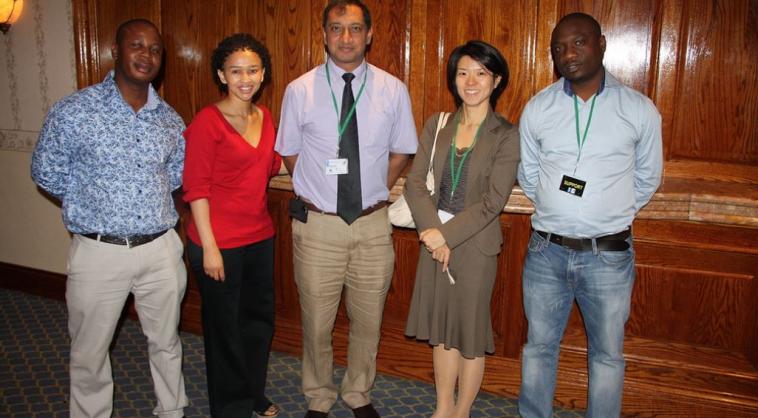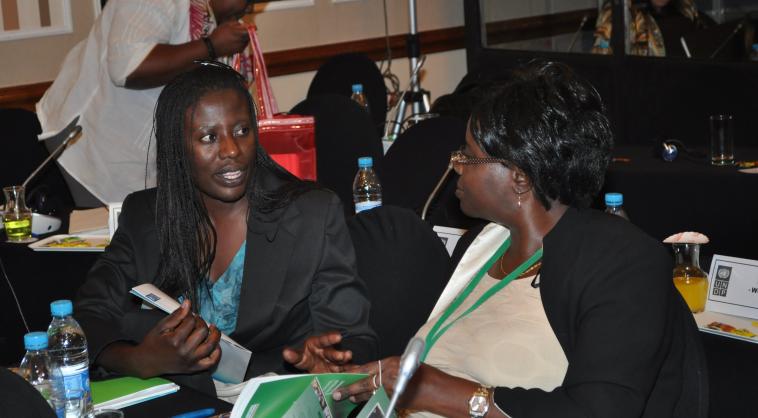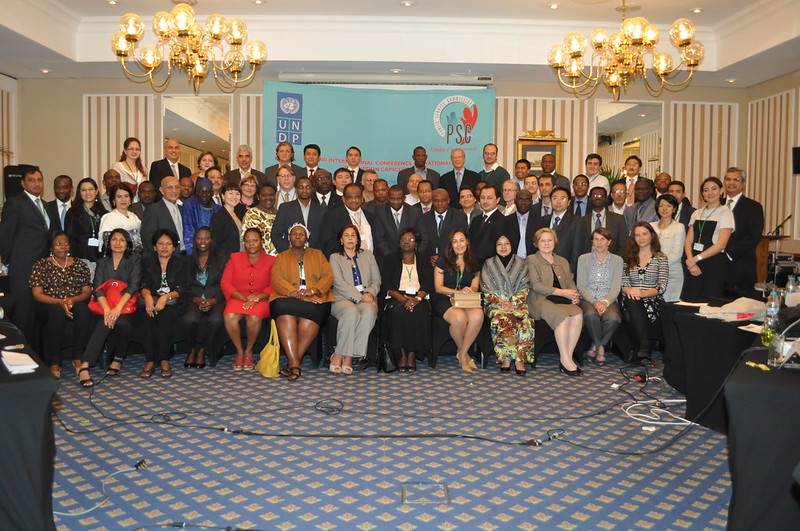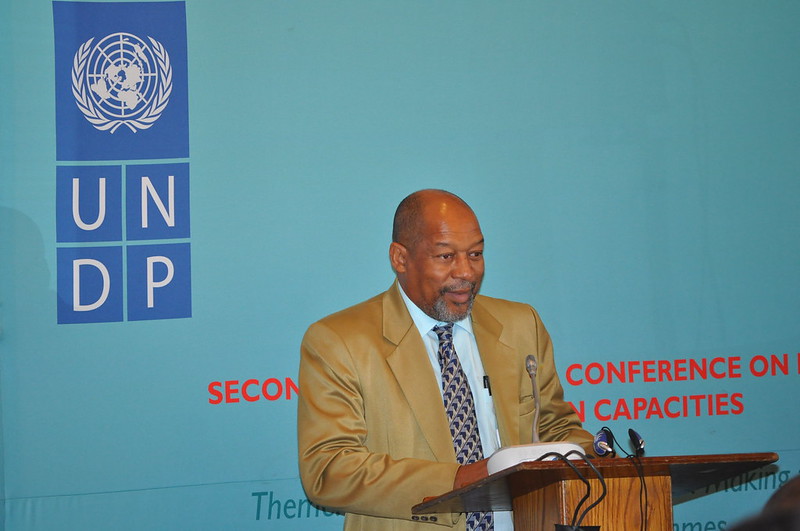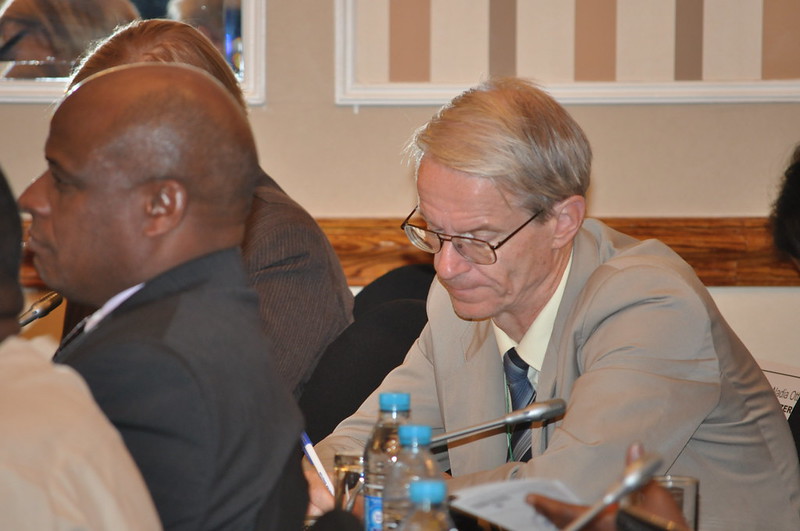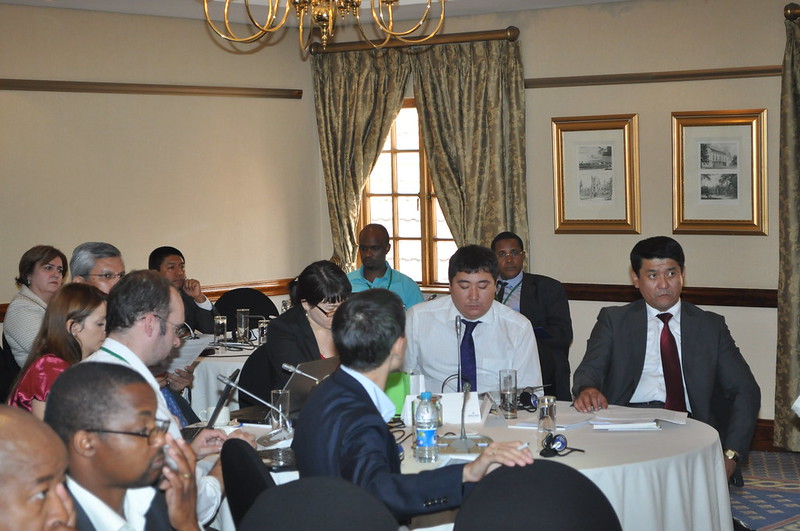MC: Ms. Azusa Kubota and Mr. Indran Naidoo Mr. Ben Mthembu, Chairperson, Public Service Commission of South Africa
Mr. Agostinho Zacarias, UN Resident Coordinator and UNDP Resident Representative in South Africa
Mr. Sean Phillips, Director General, Department of Performance monitoring and evaluation
Recap of 2009 NEC conference
Mr. Juha Uitto, Deputy Director, Officer in Charge, UNDP Evaluation Office
Conceptual Framework by the NEC Conference Advisory Group with inputs from UNDP Evaluation Office and Office of Public Service Commission: The Use of Evaluation
Chair: Ms. Ronette Engela Rapporteur: Mr. Roberto La Rovere
Presention by Mr. Rachid Benmokhtar Benabdellah, President, Observatoire Nationale de Developmment Humain - member of the Advisory Group
Discussion
Chair: Mr. Patrick Birungi
Rapporteurs:
- Mr. Roberto La Rovere & Mr. Boureima Gado
- India - ‘Role of Evaluation in 5-year planning in India’ by Ms. Sudha Pillai
- Sri Lanka - ‘Role of evaluation in influencing the policy – a Sri Lankan perspective’ by Mr. Velayuthan Sivagnanasothy
- South Africa - ‘The use question in South Africa: examples and lessons from the Public Service Commission of South Africa’ by Mr. Indran Naidoo
- Colombia - ‘Effective evaluations: processes to advocate for changes in public policy’ by Mr. Walter Mauricio Aguilar and Mr. Diego Dorado Hernandez (via video)
Chair: Mr. Seydou Yayé
Rapporteur:
- Mr. Marco Segone
- Benin - ‘Use of evaluation and development in a national assessment: the case of Benin’ by Mr. Aristide Djidjoho
- India - ‘Indian Experience with the Performance monitoring and evaluation System for Government Departments’ by Mr. Prajapati Trivedi
- Guatemala - ‘Multi-stakeholder participatory evaluation systems in the field of public policy: a case study of Guatemala’ by Mr. Henry Morales
Q&A Discussion
Chair: Ms. Thania de la Garza Navarrete
Rapporteur:
- Mr. Dieudonne Mouafo
- Brazil - ‘Promoting accountability and enhancing programs and policies through the instrumental use of the evaluations carried out by the Brazilian Court of Audit’ by Ms. Selma Maria Hayakawa C. Serpa
- Morocco - ‘Gender responsive budgeting as a tool for public policy evaluation’ by Mr. Mohammed Chafiki (recording)
Q&A Discussion
Chair: Ms. Nadira El Guermai
Chair: Mr. Velayuthan Sivagnanasothy
Rapporteur:
- Mr. Roberto La Rovere & Ms. Riitta Oksanen
- China - ‘The roles of users in enhancing utility of evaluation with special reference to the international evaluation on the funding and management performance of the national Natural Science Foundation of China” by Mr. Yonghe Zheng
- Uganda - ‘Giving national direction through evaluation: Uganda’s evaluation of its Poverty Eradication Action Plan (1997-2007)’ by Mr. Albert Byamugisha
- Morocco - ‘Observatoire National du Développement Humain information system - ONDH for the evaluation of human development public policy’ by Mr. Mohamed Benkassmi & Mr. Mohammed Mouime
- Mexico - ‘Key elements of evaluation as a decision-making tool: the specific performance evaluation experience in Mexico’ by Ms. Hortensia Perez
- Brazil -‘The evaluation system of the Ministry of Social Development and the Fight Against Hunger: strengths and weaknesses in the use of evaluation results in decision-making for social programs’ by Ms. Junia Quiroga
Chair: Mr. Armando J. Vieira Filho
Rapporteur:
- Ms. Ana Rosa Soares
- Mr. Babacar Mbaye
- Dominican Republic - ‘Dominican Republic experience in the design and implementation of a monitoring system as community methodology to measure progress and impacts of the Millennium Development Goals and National Development Strategy’ by Ms. Hernan Rodriguez Minier
- Malawi - The use of evaluation in managing for development results: evidence from Malawi’ by Mr. Ronald Mangani
- Niger - ‘The process of Project Advancement Control of the International German Cooperation: the case of the PAC Programme to Combat Poverty in Niger (LUCOP)’ by Mr. Seydou Yayé
- Tajikistan - ‘Strategic development goals and priorities of the Republic of Tajikistan: national monitoring and evaluation system for their achievements’ by Mr. Bahodir Eshboev
- Tanzania - ‘The importance of monitoring and evaluation in achieving national development policies and programmes’ targets’ by Mr. Ekingo Magembe
Q&A Discussion
Discussion on implications for country cases and way forward
Chair: Mr. Juan Manuel Cordero
Rapporteurs:
- Ms. Hortensia Perez
- Ms. Ana Rosa Soares
Recap of emerging issues and lessons from Day 1 and 2 by Session Chairs and Rapporteurs
MCs: Ms. Azusa Kubota & Mr. Indran Naidoo
Mr. Mashwahle Diphofa, Director General, Office of the Public Service Commission
Mr. Ernest Fausther, Officer in Charge, UNDP Johannesburg Regional Service Center
Mr. Juha Uitto, Deputy Director, Officer in Charge, UNDP Evaluation Office
The Public Service Commission is tasked and empowered to, amongst others, investigate, monitor, and evaluate the organisation and administration of the Public Service. This mandate also entails the evaluation of achievements, or lack thereof of Government programmes. The PSC also has an obligation to promote measures that would ensure effective and efficient performance within the Public Service and to promote values and principles of public administration as set out in the Constitution, throughout the Public Service.






